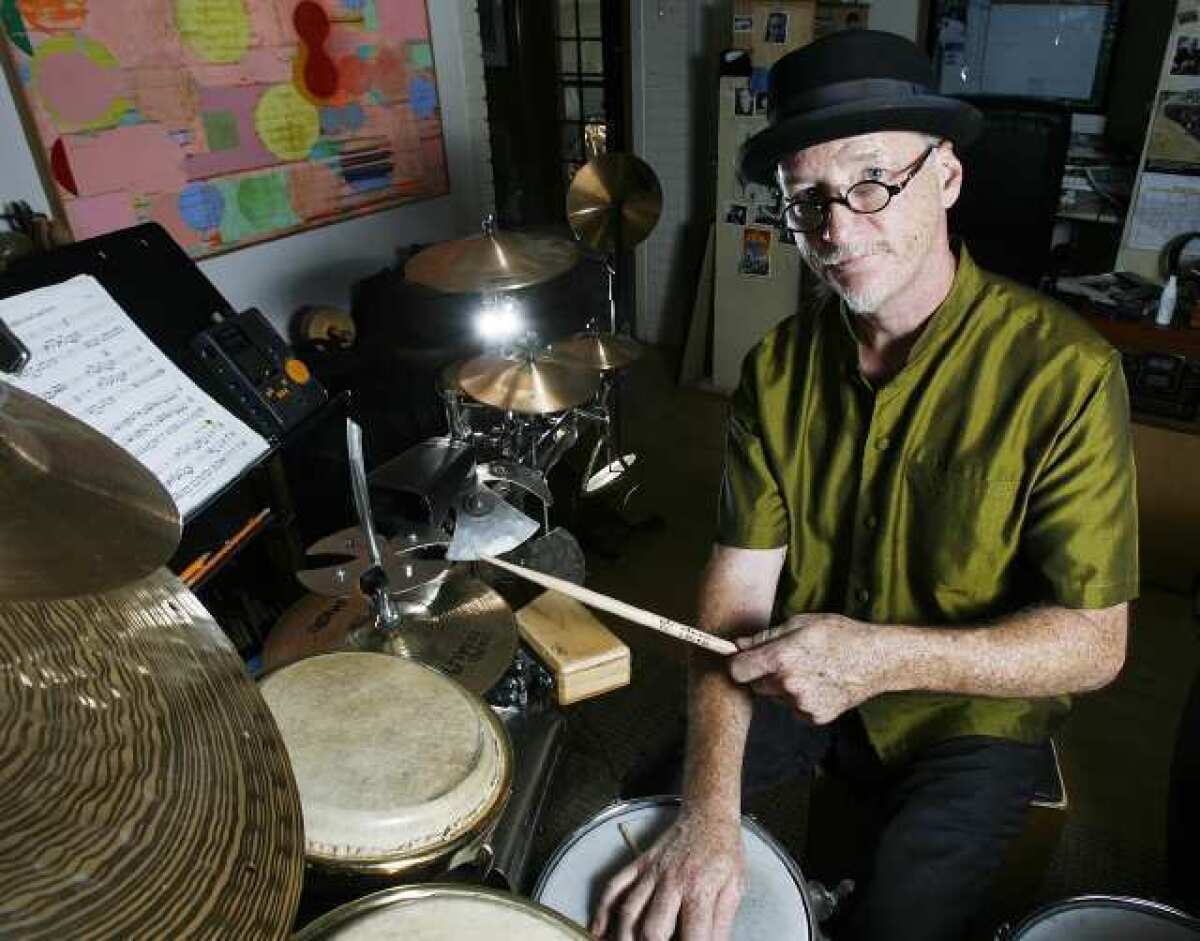Drumming up some harmony

Though it wasn’t recognized as such at the time, one of the pivotal recordings in the West Coast jazz renaissance occurred in September 1954.
Drummer Shelly Manne, one of the central figures of the postwar Los Angeles jazz flowering, recorded an unprecedented trio with trumpeter Shorty Rogers and tenor saxophonist Jimmy Giuffre. It was one of the few precedents for the free jazz explosion that followed in the ‘60s, and it’s gone largely unheralded until now.
The high-profile studio and avant garde percussionist Brad Dutz has revisited Manne’s seminal album, “The Three and the Two,” in his own trio the Other Three.
Manne (who died in 1984) and his collaborators dispensed with piano and bass, emphasizing harmonic connections. Dutz, unusually sensitive to the tonality of his many hand and mallet instruments, has enlisted two other intuitive players: trumpeter John Fumo and saxophonist Kim Richmond. Together they’ll headline at Alex Cline and Will Salmon’s monthly Open Gate Theatre concert in Eagle Rock on Sunday, along with the band Slumgum.
Like Dutz, Manne could wring an impressive range of tonalities out of his trap kit. Cline, also a drummer, took a four-session workshop with Manne at the old Dick Grove Workshop. Coming to jazz through rock music of the ‘60s and ‘70s and the avant garde, Manne impressed him on several counts.
“I was struck by his exceptional musicality, his inventiveness and his swing — all qualities I lacked in my early playing days,” Cline says. “He never assembled his entire kit through the course of the class. But the degree of swing he achieved was actually palpable. It was life-altering for me.”
Cline’s subsequent investigation of Manne’s work led him to “The Three and the Two” album, on Contemporary. Cline brought the little-known album to Dutz’s attention a few years ago.
“Shelly was just a great all-around musician who could write as well as play,” says Dutz, from his Tujunga home. “I always loved the way he tuned his drums and the beautiful sound he got. On ‘The Three’ he approached the trap set as a third melodic instrument, exchanging with the horns.”
Los Angeles Jazz Institute chief executive and West Coast jazz scholar Ken Poston notes that the origins of “The Three” album began during the time Giuffre, Rogers and Manne were all playing in the Lighthouse All Stars.
“Shorty and Giuffre were studying privately with Dr. Wesley LaViolette — mainly counterpoint,” he says. “The album came right out of that association. They were able to play these intuitive things with free-floating time because they had such a strong rapport built up. Although Lennie Tristano had done some free explorations earlier, there was nothing like ‘The Three.’ That kind of experimentation could only have happened in California — Shelly paved the way for irregular rhythms and implied time. ‘The Three’ really is a jazz conversation.”
A Texas native, Dutz came West 30 years ago. His association with Richmond commenced about seven years later. “I started playing in his big band,” Dutz points out. “You have to surround yourself with better players than yourself; that’s why I got Kim and Fumo. I try to learn from both of them, so I wrote the pieces in the Other Three as melodic trios.”
Fumo’s versatility allows him to sound like a flugelhorn on the trumpet and to play the tonally demanding piccolo trumpet. “John can play musical scores, rock bands, salsa bands, and he can take it totally far-out too,” Cline says.
Dutz wisely avoided a reiteration, and created an homage that was still personal. “When I first heard the Other Three album it blew my mind,” Cline says. “They were able to channel the original ‘Three,’ but it still sounded like a Brad Dutz record.”
KIRK SILSBEE writes about jazz and culture for Marquee.
---
Brad Dutz’s Other Three
Where: Eagle Rock Center for the Arts, 2225 Colorado Blvd., Eagle Rock
When: Sunday, Sept. 2, 7 p.m.
Contact: (626) 795-4989